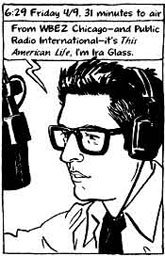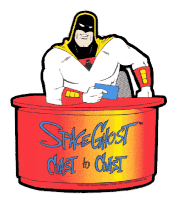My Radio, My God
Lisa Anderson: "I haven't introduced myself to the KRCC staff as Lisa the Christian. And I thought that was okay until my second outing." NPR's gifts of the spirit and the Bible's strange demands.
NPR’s gifts of the spirit and the Bible’s strange demands
By Lisa Anderson
 |
We’re in the midst of the fall public radio pledge drive at KRCC, Colorado Springs’ public radio station, and Ira Glass, host of This American Life, is working his pitch. I think you’ve heard this one:
IG: This is Ira Glass of This American Life. As you consider whether or not you are, in fact, the person that we’re asking, that I’m asking, right now, to give money, I would encourage you to examine your behavior at this exact moment — right this second — are you like Alexandra Roach, a real listener, who found that she could not turn off her public radio station, even during the on-air fund drives:
AR: I couldn’t do it. I would change the channel and I would start listening to another show and it would sicken me, it would drive me crazy. I just couldn’t stand it.
IG: Why?
AR: A pledge drive is better than any other radio show. I don’t know, I?
IG: Oh my God. (laughs)
AR: I hate commercials. I hate commercials.
IG: But Alexandra, the pledge drive is a commercial. (music swells)
IG: If this is you, if you feel like you have to stay with us even during the drive, friend, you are who we’re talking to. You are who I’m talking to right now. I mean, look at yourself. You know what kind of person you are? You’re the kind of person who stays tuned to the public radio station during the pitch break. That is what a hardcore public radio listener you are. And that means that we need your help. You.
Even though I’ve heard this particular pitch several times, it gets me again. I’m beginning my second year as a freeform DJ and I’m still taken with public radio. The eccentric coworkers, the late nights driving home high on good music and the compliments of regular listeners and even the pledge drive itself: It’s just wonderful.
The phone rings.
“KRCC. May I take your pledge?” I’m on a version of auto-pilot that allows me to listen to the radio, answer the phones simultaneously keeping my place in Nickel and Dimed.
“No!” an angry woman replies.
I stop reading.
“I’ll never pledge to KRCC again,” she continues. “That man who was just speaking took God’s name in vain. I don’t talk like that. I don’t let my children listen to talk like that. I don’t support media that air that sort of language.”
That was Ira Glass, I think. Not that man, but The Man: a person whose story, perspective and voice have become such an integral and redemptive force in public radio and story in America — or at least my Friday evenings.
After about thirty seconds more of her frustration, I thank the caller for her feedback — her valuable input — and hang up. The evening jazz DJ, who had been waiting to add this caller’s name to the list of people he would be thanking on the air, looks at me quizzically.
“Ira Glass took God’s name in vain,” I say.
“Oh, God, no.” He feigns horror.
“God, are you serious?” someone else in the room asks.
“God, I hate it when he does that,” the reggae DJ adds.
Their comments are funny. Well delivered, too, but the exchange induces a sort of schizophrenia in me. In the caller’s mind at least, I am Public Radio. Her comments were aimed at me. As Public Radio, I thought her complaint was silly. I thought about all of the films and music and conversations that she would need to shelter her children from if she was offended by an NPR pledge drive promotion.
However, like the caller, I do not use the word “God” flippantly. In fact, I can count on my hands the number of times I’ve done so in my 26 years. And in my mind, my choice is somehow connected to those etched words about taking the LORD’s name in vain. But I’m also aware that we aren’t actually saying his name when we say “Lord” or “God.” Those English terms aren’t equivalents of his Name, the Name that wasn’t to be uttered and could only be pointed to by the word Jehovah. And the comments made by my compatriots were disrespectful to that God — the God I’m trying to know. So there’s static between us, too.
***
 |
The phone interview for volunteering at KRCC was going really well, when the station manager, Mario, asked: “And where am I calling you?”
“IBS,” I answered, giving him the acronymic (and therefore less-obvious) name of my nonprofit Christian employer.
“Huh,” he mused aloud, “the only IBS I know is the International Bible Society.”
“Uh, yeah. That’s where I work.”
“Do you know why I don’t believe in God?” he asked, hardly pausing.
His story about why he didn’t believe in God was pretty familiar: bad church, bad churchgoers, bad church history.
I confessed that I, too, had a hard time with Christian hypocrisy (who doesn’t?) and the church’s tendency to ignore social justice issues. I submitted that following Christ unfortunately comes at the expense of associating myself with two thousand years of human failures in his name.
Mario was curious to see if his community could sustain a strange element like me. “We’re an inclusive environment, a diverse community.” If I was interested in being part of that community, I was welcome. “But you know who won’t like this?” he asked rhetorically, “The cool people. I can’t wait.” Click.
Great, I thought, I’m going to be the token Christian. I imagined Mario’s cool people. People with smooth voices, expansive vocabularies, mad technical skills and an automatic dislike for me.
***
Among other things, the nonprofit for which I work publishes the Bible. As news of my moonlighting for the local NPR affiliate station spread, my colleagues met me with a range of responses, from ignorance to incredulity to enthusiasm.
Okay, maybe only one enthusiasm.
Because I live in a region of the country that seems to mistake American patriotism and GOP affiliation for the fruit of the spirit, I was most often asked why I would want to involve myself with an obviously liberal entity. A concerned co-worker would then wait for me to say something. It was as though I could make everything okay again by explaining that the radio station was my new mission field. Infiltrating the other side and all that.
Sometimes I was tempted to say something palatable just to avoid the work of explaining. But, I could only offer that I really enjoy public radio and that I want to help make it happen.
***
 |
I haven’t introduced myself to the KRCC staff as Lisa the Christian. And I thought that was okay until my second outing. Adam, another DJ, and I were standing in the street, leaning against my car after his shift. It was dark and I watched his confusion evolve in the strobe light of the passing cars.
A: So, where do you work?
L: A Christian non-profit.
A: —- (shocked)
L: Uh, I am a Christian.
A: (in a slightly too loud, relieved tone) Oh, you’re shitting me.
L: No, really. I’m a Christian.
(awkward pause)
A: Are you very Christian?
L: What do you mean?
A: Are you a FUNDAMENTALIST?
L: What do you mean by “fundamentalist?”
A: Do you hate homosexuals?
L: Adam, you know I don’t hate homosexuals. Half of the people we work with are homosexual.
At this point, it is only fair to mention that the listening area we serve includes large numbers of conservative, politically active, believers. The DJ training for volunteers like me includes a mini-lecture on the relationship between our station and the very vocal Christian right within our community.
Station lore has it that a local church has commissioned several of its members to monitor the station around the clock and complain to our archenemy, the FCC, whenever we inadvertently curse on air or play music with lyrics they don’t like. I’m thinking that it is this Christian who comes most immediately to Adam’s mind. That I would call myself by this name must seem unbelievable.
Adam mumbled something about his grandmother and dinner and excused himself. So we didn’t have a chance to discuss the why or how of my belief or the way words failed us when their sub-culturally charged definitions broke down.
Our next conversation orbited tightly around Bjork’s appearance on Space Ghost Coast to Coast. I was left wondering which Christian prototype — the televangelist, the culturally insensitive spinster missionary — Adam had ascribed to me. He did have our previous relationship to look back to, but judging by his reaction to my coming out, he thought that his earlier impressions (ostensibly of my being interesting or thoughtful) and my profession of faith to be incompatible.
Adam could have dismissed me immediately if I had been Christian in a way that he recognized. He might not have wasted his time befriending me. He already knew that he didn’t like those people. But when the label came too late in our friendship, Adam felt deceived by me in some way.
 |
| Bridging the God Gap |
And this is where things become difficult for me. Because I feel like a translator. Or an evangelist. Or the child of a nasty divorce. I champion the causes of both organizations. At IBS I tell everyone how great it is to be part of a small band of people so connected by a cause that they’ll stay up until two in the morning playing requests for forty listeners. So devoted that they’ll answer phones and solicit funds to keep a good thing going. At KRCC I want to talk with the guy drawing ornate demon horns on a picture of Dr. Dobson and tell him that there are many sorts of Christians and that he might actually like some of them.
But most of the time I just want to do the things that drew me to these strange causes in the first place. I want to see the beauty of the scriptures and feel connection to America’s amazing, ongoing story. I want to share these separate wonders with people and find out that they are somehow part of what makes me whole. I want to learn to listen better.
And that means I need your help. You.
Lisa Anderson is a writer and DJ in Colorado Springs.